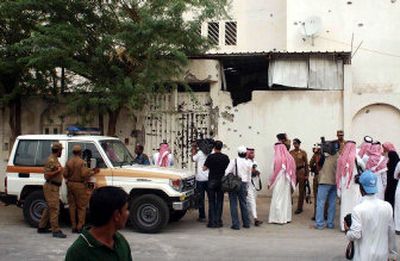Saudi police battle extremists

RIYADH, Saudi Arabia – Police raids touched off fierce gunbattles Thursday that killed six Islamic extremists, and authorities said the dead included al-Qaida’s leader in Saudi Arabia, whose hideout was found to hold the head of a murdered American last summer. A police officer was also killed.
Saleh Mohammed al-Aoofi, the kingdom’s top fugitive, had led local al-Qaida operations since his predecessor was killed by police a year ago during a crackdown on religious militants in the homeland of Osama bin Laden and most of the Sept. 11 suicide hijackers.
Al-Aoofi was believed involved in the June 2004 kidnapping and beheading of engineer Paul M. Johnson Jr., whose body was shown in photos on the Internet. A few weeks after the slaying, police found Johnson’s head in a freezer at an apartment that had been used by al-Aoofi.
The former Saudi prison guard was one of only two people still at large from a list of 26 most-wanted militants that was issued in December 2003. The remaining militant is another Saudi, Talib Saud Abdullah al-Talib. The others have been either captured or killed.
Saudi authorities issued a second list of 36 suspects in June, several of whom have already been arrested or killed. It was not immediately known if any of the 15 other suspects slain or captured in Thursday’s raids in Riyadh and the holy city of Medina were on that list.
The Interior Ministry said security officers staged a series of near simultaneous raids at six suspected militant hideouts in Medina, several of them near the Nabawi mosque, where Islam’s Prophet Muhammad was buried.
At a seventh site, police battled with three militants holed up in a building, leaving two extremists dead, including al-Aoofi, the ministry said. The third suspect was wounded and captured, and one policeman and a resident of the building also were wounded, it said. The official Saudi Press Agency said later that the policeman had died.
At the same time, police fought with militants at an apartment in the al-Massef neighborhood of Riyadh. Four extremists were killed there, said a security official, who spoke on condition of anonymity because he was not authorized to speak to journalists.
The Interior Ministry statement said human remains found at the Riyadh site indicated at least one militant was blown apart in an explosion. It said one extremist was arrested and a cache of weapons, explosives and money was found.
The raids came hours before King Abdullah arrived in Medina to meet with tribal leaders and pray at the Nabawi mosque. The crackdown on al-Qaida began while Abdullah was de facto ruler, and he vowed to push ahead when he was elevated to king this month after the death of his half brother Fahd.
It was unclear if the raids had anything to do with last week’s decision by the U.S. Embassy in Riyadh to close for two days or the warning from the British and Australian governments for their citizens in the kingdom to be cautious amid reports that militants planned attacks.
The Interior Ministry said at the time it had no information that a terror attack was imminent. Britain’s government said preparations for an extremist assault were in the final stages.
The last major attack by militants came in December, when gunmen invaded the heavily guarded U.S. Consulate in Jiddah and killed nine people.
Al-Aoofi was a veteran Islamic militant. He reportedly fought alongside Muslim separatists in Russia’s Chechnya region, then traveled to Afghanistan shortly before the Sept. 11 terror attacks on Washington and New York. It was in Afghanistan that he met men who would later become his comrades in the Saudi terror network, Saudi newspapers have reported.
He was a top deputy in al-Qaida’s cell in Saudi Arabia when it launched a violent campaign with car bombings that killed 35 people at foreigners’ housing compounds May 12, 2003.